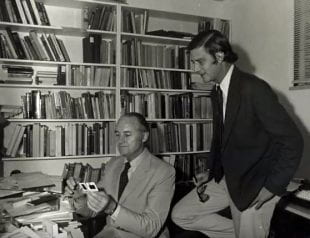
Walter Widrig
Walter Widrig, professor emeritus of art and art history who taught at Rice for 31 years, died July 27. He was 90.
Widrig, who chaired Rice’s Department of Art and Art History from 1982 to 1985, was a world-renowned archaeologist and art and architectural historian who worked on excavations in England, Libya, Italy, Cyprus, Syria, Jordan, the Balkans, Turkey and Tunisia. While at Rice, he and colleague Philip Oliver-Smith focused on the Via Gabina archaeological dig, an excavation of several villas and farm buildings near Rome that ranged in date from 300 B.C. through 900 A.D.
Between the summers of 1976 and 1991, Widrig invited over 100 students to work at Via Gabina, an experience that enriched their lives so significantly many of them later teamed up to establish an endowed traveling fellowship at Rice, the Amici di Via Gabina Fellowship.
 “Of all the many international opportunities that Rice has offered students over the years … no other has offered such a valuable experience to our students … and fostered such respect and affection, not only for Walter, but also for Rice University itself,” according to a letter nominating Widrig for the Association of Rice Alumni Meritorious Service Award he won in 2015.
“Of all the many international opportunities that Rice has offered students over the years … no other has offered such a valuable experience to our students … and fostered such respect and affection, not only for Walter, but also for Rice University itself,” according to a letter nominating Widrig for the Association of Rice Alumni Meritorious Service Award he won in 2015.
Widrig’s areas of expertise included Roman and early Christian art and architecture, as well as the history of architecture during the Renaissance, Baroque and Modern periods. His publications included a number of papers that appeared in scholarly journals, individual chapters in edited collections, and the monograph “The Via Gabina Villas: Sites 10, 11, and 13.”
His expertise was renowned far beyond the hedges of Rice. Widrig was knighted by Italy and inducted into England’s Society of Antiquaries for exceptional contributions to his field.

